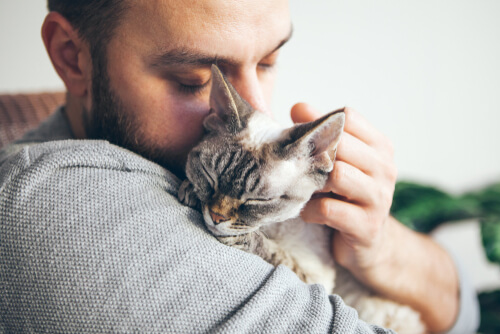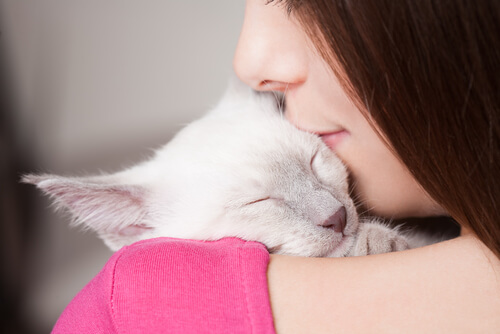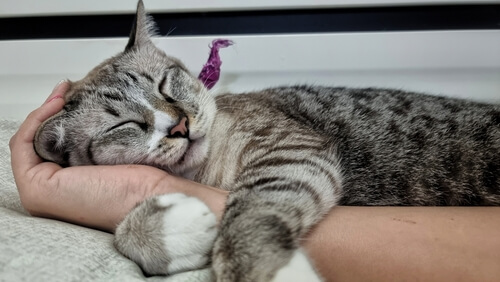It’s not uncommon to consider household pets as our own family members. Now more than ever, Americans are spending more time with their pets- the number of people working from home tripled between the years the Covid-19 pandemic hit us the hardest. It’s easy to say we love our furry family members, but for the large population of people struggling with conditions ranging from depression and anxiety to post traumatic stress disorder, they can provide at-home healthcare and key emotional support. Emotional support cats and dogs are known to effectively ease feelings of depression and anxiety by providing companionship and interacting with their owner.
Usually, the term “emotional support animal” will prompt one to imagine a dog in a vest. Did you know that any domesticated animal can be registered as a support animal and qualify as essential for mental health support? So, can cats be emotional support animals? In short, not only can they, but they are a great choice as an ESA (emotional support animal). Although cats may be the “underdog” when it comes to basic knowledge about emotional support animals, let’s explore the question- can cats be emotional support animals?

Cats are great emotional support animals that are highly interactive and can comfort their owners in times of need. They not only help boost our overall mood, but can help with a number of mental health issues and disorders. Registering a cat as your emotional support animal can be an excellent choice on your journey to live a fulfilling life and avoid the obstacles of your mental health state that prevent you from doing so.
How Do Emotional Support Cats Benefit Mental Health?
Depression and Anxiety Disorders
The benefits of having an emotional support cat around offer a large variety of perks both physical and psychological for people struggling with mental health. In fact, just holding or petting an emotional support cat was found to decrease feelings of anxiety, loneliness, stress, and depression as well as stabilizing heart rate and blood pressure. Benefits of interacting with an emotional support cat included feeling calm and relaxed and enhancing social engagement. Cats are known to cuddle with their owners throughout the day, therefore offering these health advantages frequently. Seeing the friendly face of your emotional support cat is sure to boost your mood. Feeling the companionship of your cat wanting to interact with you will guarantee you don’t feel lonely. Cats have a very keen sense of our feelings, and actually tend to interact more often with depressed humans. Therefore, they are actively seeking out when we need the positive emotional support cats can give.

Insomnia
Insomnia is a common sleep disorder, associated with having trouble falling or staying asleep also negatively affecting the quality of sleep. Up to 40% of the general population experiences insomnia, as well as the poor effects on quality of life that come with it. Insomnia can affect both mental and physical health, causing a range of ailments such as difficulty concentrating, poor memory, lack of energy, increased risk of diabetes, heart problems, and more. However, sleeping with your emotional support cat can increase the quality of sleep. This leads to a higher sleep efficiency score, therefore decreasing risk and symptoms of insomnia and reversing its negative effects. Registering your cat as a support animal can be useful if you suffer from insomnia and have to take a long flight, for example. As specified in the Air Class Carrier Act, your emotional support cat can be on the plane with you, as long as the crate fits under the seat in front of you. Make sure you check your airline’s policies about flying with service animals as they can vary. You won’t be able to take your emotional support cat out of the crate, but just having the comfort of knowing they are there with you could ease anxiety and insomnia.
PTSD (Post Traumatic Stress Disorder)
Post Traumatic Stress Disorder, or PTSD, is a severe disorder in which one can suffer from disturbing, intense thoughts related to a traumatic event victims witnessed or suffered. The disorder causes one to relive their trauma in nightmares or flashbacks that can come on suddenly. PTSD causes heightened anxiety, stress, depression, and even anger at all times, and can cause a feeling of being detached from the world and people around them. This disorder is most common in veterans, but can affect anyone who has been through or witnessed something traumatic. This can include car accidents, childhood abuse, and death, though these are just a few examples. Some of the benefits of having an emotional support pet in veterans alone are significantly less frequent nightmares, decreased feelings of social isolation, and lower overall depression, anxiety, and anger.

Get Your Cat Registered
In California, to have your cat registered as a support animal, you must have a written recommendation from a licensed therapist or a physician. The recommendation must specify that you struggle with mental health and need an emotional support cat.


